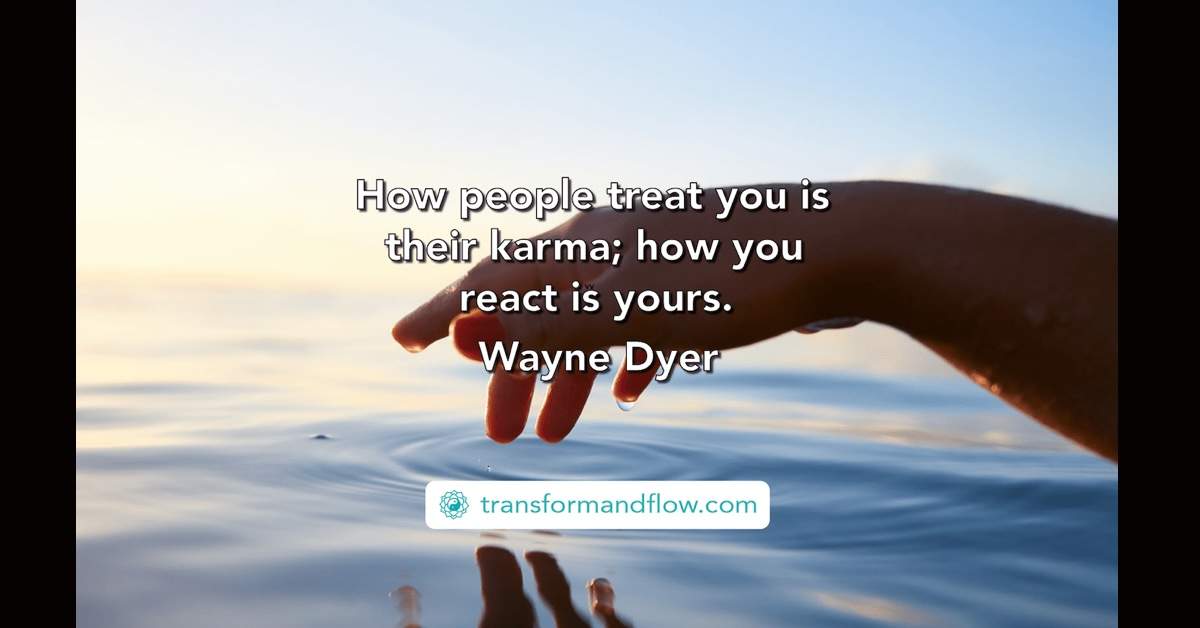“How people treat you is their karma; how you react is yours.” – Wayne Dyer
Life is full of interactions, and each day we encounter people whose actions can either uplift or challenge us. Some may be kind and supportive, while others may be rude, dismissive, or even hostile. The way people treat us, however, is a reflection of their character, beliefs, and life experiences—not necessarily our own worth. In contrast, how we respond to them is entirely within our control, and it shapes our own karma, emotional well-being, and future interactions.
Wayne Dyer’s profound quote reminds us that we cannot control how others behave, but we can control our reactions. This ability to choose our response is a powerful tool in cultivating peace of mind, increasing productivity, and developing emotional intelligence.
In this blog, we will explore:
- The concept of karma and its role in shaping our lives.
- What differentiates humans from animals and why self-awareness is key to personal responsibility.
- How conscious control of our reactions leads to peace and productivity.
- Five key habits to master your reactions and improve your life.
Understanding Karma: A Universal Truth
Karma is often misunderstood as a mystical force that brings good or bad luck. In reality, karma is a universal principle of cause and effect—our actions create consequences that shape our future experiences.
Every thought, word, and action contributes to the reality we experience. When we act with kindness, patience, and integrity, we cultivate positive karma, attracting more peace and fulfillment into our lives. On the other hand, reacting with anger, resentment, or impulsivity leads to negativity, reinforcing cycles of conflict and distress.
A great resource on understanding karma is What Is Karma and How Does It Work? – Isha Institute of Inner Sciences, which explains how our choices create ripple effects that shape our personal and collective experiences.
By recognizing karma as a law of accountability, we empower ourselves to make wiser decisions, particularly in how we respond to the actions of others.
What Differentiates Humans From Other Animals? Self-Awareness
Unlike other animals, humans possess self-awareness—the ability to reflect on our thoughts, emotions, and actions. This consciousness allows us to take responsibility for how we behave, rather than merely reacting on instinct.
Animals respond to stimuli based on survival instincts. A dog may growl when threatened, and a deer may flee when sensing danger. Their reactions are automatic, based on immediate needs. Humans, however, have the ability to pause, reflect, and choose a response that aligns with long-term goals rather than short-term emotions.
This distinction gives us a moral and ethical responsibility—we are accountable for our reactions because we are aware of their consequences. While someone may insult or mistreat us, we have the power to choose whether to retaliate, remain indifferent, or respond with understanding.
For a deeper dive into human self-awareness and responsibility, check out Self-Consciousness – Stanford Encyclopedia of Philosophy.
Understanding that we are not slaves to our emotions but instead possess the ability to choose how we react is a game-changer for emotional intelligence and personal growth.
Why Controlling Your Reactions Leads to Peace and Productivity
When we react impulsively to negative situations, we often escalate stress, prolong conflicts, and drain our emotional energy. Conversely, practicing self-control in our reactions contributes to inner peace and increased productivity in areas that truly matter.
1. Inner Peace
By learning to regulate our responses, we prevent unnecessary emotional turbulence. Rather than letting someone else’s negativity ruin our day, we can observe, process, and respond thoughtfully. This mindset protects our well-being, reduces anxiety, and fosters resilience.
2. Increased Productivity
When we are not emotionally reactive, we can redirect our focus to what truly matters—our goals, personal growth, and meaningful relationships. Instead of wasting energy on conflicts, we invest it in projects, learning, and creativity.
Practical guides on emotional regulation and productivity can be found in Harvard Business Review’s articles on emotional intelligence library.
By mastering our responses, we unlock a life that is calmer, more focused, and filled with purpose.
Five Key Habits to Master Your Reactions
To truly take control of how we respond to the way others treat us, we must develop conscious habits that strengthen emotional intelligence. Here are five key practices to begin this journey:
1. Pause Before Reacting
Whenever someone says or does something triggering, take a deep breath before responding. This simple pause allows you to:
- Evaluate the situation with clarity.
- Prevent impulsive reactions that you might regret.
- Choose a response that aligns with your values.
This habit is often called the “sacred pause,” a technique used in mindfulness to create space between stimulus and response.
2. Practice Detachment from External Validation
Many emotional reactions stem from seeking approval or fearing rejection. If someone criticizes or disrespects us, we often take it personally, reacting with anger or sadness. By practicing emotional detachment, we realize that:
- People’s opinions are reflections of their perspectives, not our worth.
- We don’t need external validation to feel confident and secure.
- Inner peace comes from self-acceptance, not from pleasing others.
Meditation and journaling are great tools to cultivate emotional independence.
3. Reframe Negative Situations
When faced with criticism, rejection, or hostility, ask yourself: What can I learn from this? Instead of labeling an experience as “bad,” shift your perspective:
- Criticism can be a tool for self-improvement.
- Rejection may redirect you toward a better opportunity.
- Someone’s rudeness is often a reflection of their struggles, not yours.
By choosing to see challenges as opportunities, we neutralize their negative emotional impact.
4. Develop Emotional Intelligence Through Mindfulness
Mindfulness helps us become aware of our emotions without being controlled by them. By practicing mindfulness, we learn to observe feelings as they arise and let them pass without reacting impulsively.
Some practical ways to incorporate mindfulness include:
- Daily meditation to improve emotional awareness.
- Deep breathing exercises to regulate stress responses.
- Observing emotions without judgment before choosing a reaction.
Resources like Mindful.org offer excellent guides on mindfulness practices for emotional control.
5. Set Personal Boundaries
Controlling your reactions does not mean tolerating toxic behavior. It means responding assertively rather than emotionally. Setting clear boundaries helps you:
- Protect your mental and emotional health.
- Avoid engaging in unnecessary drama.
- Ensure that you only invest energy in relationships that uplift you.
Communicate boundaries with confidence and self-respect, ensuring that others know what behavior is acceptable in your space.
Final Thoughts: Taking Control of Your Karma
Wayne Dyer’s quote serves as a powerful reminder that our inner peace is in our hands. People will treat us in various ways—some with kindness, others with hostility—but our reactions define our karma and our well-being.
Key Takeaways:
- Karma is about personal responsibility—our actions create our reality.
- Humans have self-awareness, making us accountable for our reactions.
- Mastering our responses leads to greater peace and productivity.
- Developing habits like pausing before reacting, emotional detachment, and mindfulness enhances self-control.
- Boundaries protect our energy, allowing us to focus on personal growth.
By consciously choosing how we react to life’s challenges, we reclaim our power, cultivate resilience, and create a future filled with wisdom, peace, and success.


